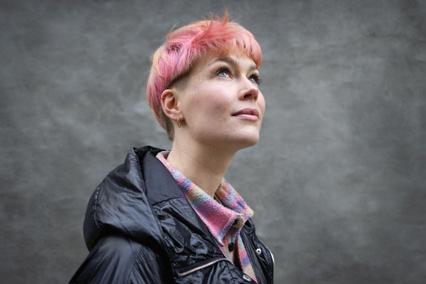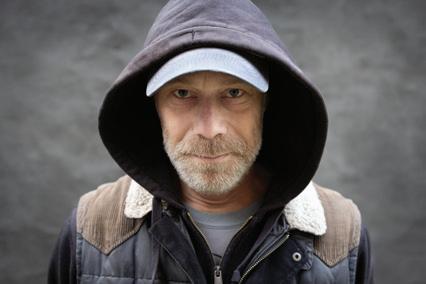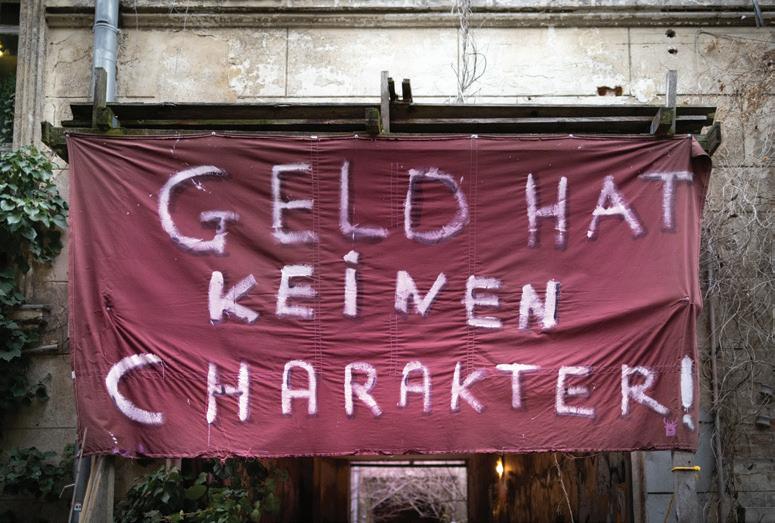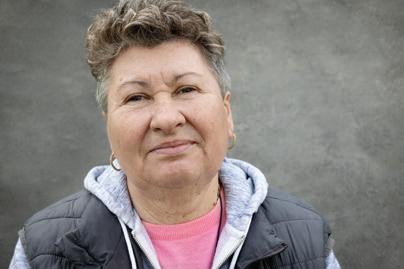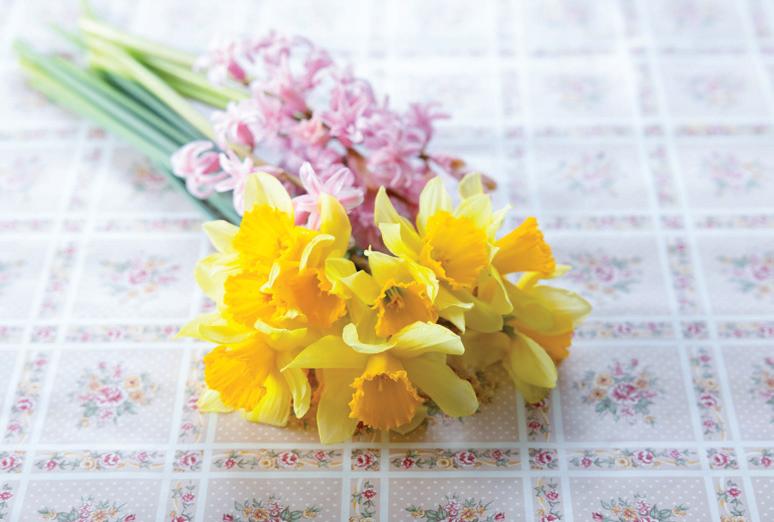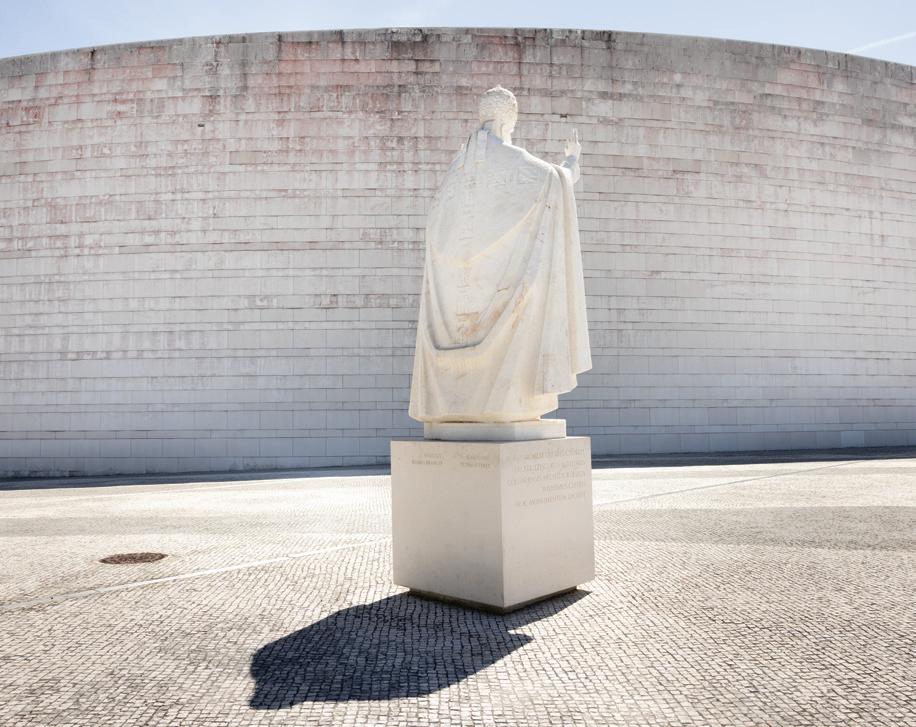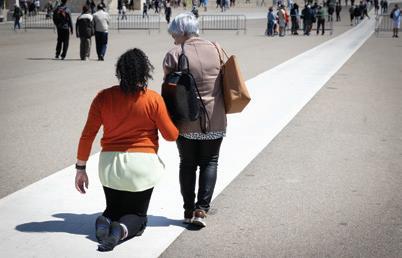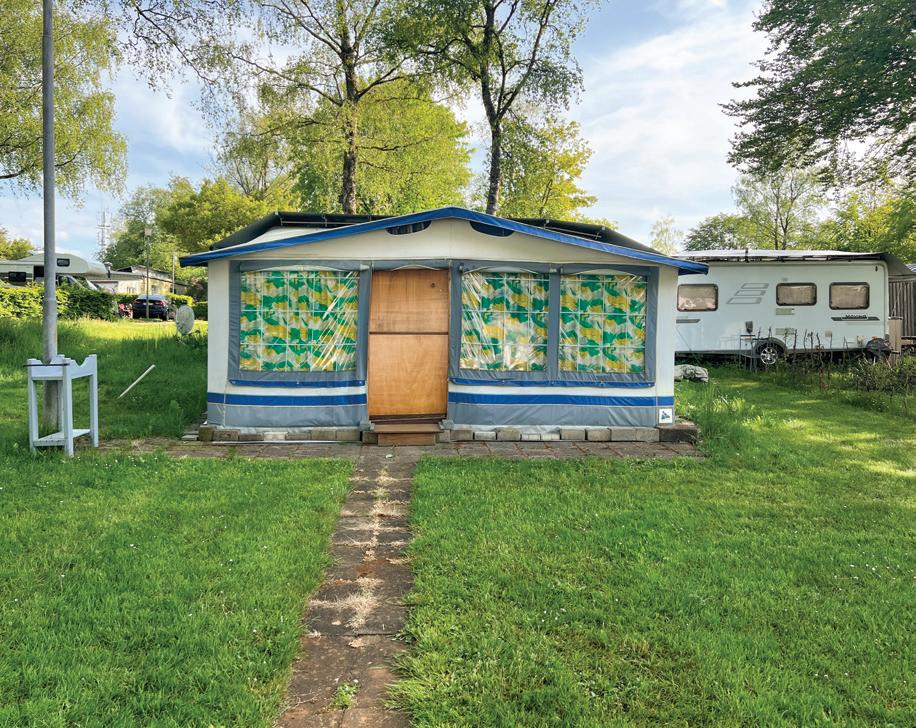Eugenia Greece
Paralia Katerinis — 20 March
My mind has always been fairly malleable, but now because of my recent conversations it really is shooting in all directions. I (deliberately) doubt everything I know or think I know, balancing daily between being moved by beauty and being deeply concerned about the state of the world – or at least about our continent, Europe. All my senses are open, as they are when you travel. Right now, for example, I can hear the sea on this somewhat chilly beach here in northern Greece, and I imagine that the sound is almost identical to the sound you hear when you ski down a mountain slowly and at a constant pace.
We are literally stranded in a deserted holiday resort which looks like a film set that has been abandoned by the crew and actors. In summer, the place must be packed with tourists, but now, this early in the season, most hotels are closed and the many shops have their shutters down, as if a bomb had gone off. Everyone has fled, only the stones can’t leave, and the sea is the only sound that remains.
Yesterday I spoke to a Greek mother, a divorcee with two young children. She is worried. The Greeks no longer have faith in politics, she tells me. They have experienced one crisis after another and this makes her fear for democracy, which was invented in this country so many centuries ago. When people buy a new smartphone, she says, they consult endlessly with their friends and they research brands and prices in detail. But when they go and vote, they just do whatever. They just pick a name that rings a vague bell
and without doing any research or knowing anything they just tick a box.
That behaviour, where materialism takes precedence over quality of life and democracy, scares her. Her biggest fear is a third world war. She believes it is on Europe’s doorstep. If we open that door, it will be too late, she fears.
As she tells me this, her two children do their homework obediently at the big table.
Eugenia with her children Anna and Aimilios.
Bălăceanca, near Bucharest — 29 March
I can also still see before me the images of the summary execution of the ruthless dictator Nicolae Ceaușescu and his wife Elena. It was popular anger, as sudden as it was overwhelming, that led to the fall of the entrenched regime. That collapse came as unexpectedly as the fall of the Berlin Wall had earlier.
Elena shouted that she wanted to be shot dead along with her husband. We could watch it live on television as if it were a film. She resisted having her hands tied behind her back. The moment he realised his own army was going to finish him off, Ceaușescu said nothing more, I think. Then came the shots, dry and almost careless, it seemed. Ceaușescu was lying hunched up on the ground when they certified his death. I saw those images in the news and thought at the time that Romanians would be relieved, that they would feel liberated from years of oppression by those two
monsters. But what I hear now shows once again that history is never just black and white.
Today I am photographing a woman with short grey hair who hastily pulls some weeds from her vegetable garden and fills our arms with pink hyacinths and yellow daffodils. Her name is Petrica, she is in her 60s and retired. She used to work in a restaurant.
When I ask her how she remembers the dictatorship, her gaze softens. For her and her husband, she says, it was a period of peace and security. There was no daily stress to survive. Everything was taken care of. Today, things are much more difficult.
I can’t and won’t argue with that. How we look at history quickly takes an interesting turn when you hear such a personal view.
Petrica also has fond memories of the dictatorship: ‘A period of peace and security.’
Fátima
Fátima — 10 May
I watch as Andrea, with the support of her husband, shuffles centimetre by centimetre on her bare knees across the main square towards the Basilica of Our Lady of Fátima, the Lourdes of Portugal so to speak, about an hour and a half’s drive from Lisbon. Through my lens, I can read the pain on her face. She is a woman with blonde hair well into her 40s. When she finally reaches her goal, the steps of the basilica, and wearily stands upright again, I go up to her. She politely asks me not to use the photos I took of her. I solemnly promise, on Our Lady of Fátima herself.
She tells me they have come to this pilgrimage site to ask a favour of Mary. Their daughter is gravely ill and it is uncertain whether she will survive. Andrea makes it clear to me that she is willing to do everything within her power to save her child. There is no point asking me if I believe the Virgin Mary appeared here several times to the three shepherd children Lúcia, Jacinta and Francisco in 1917. Nor do I know if I should believe that she gave those children three messages. But I certainly do believe in the power that people like Andrea feel here. Pilgrims of all kinds gather here from all over the world. They are all looking for something. They pray for support for what lies ahead. They crawl, say endless rosaries, burn candles. I am moved by that display by so many people of profound devotion, of humility, asking for favours or forgiveness for their sins.
When Marij and I turn to two couples in the large dusty car park at the pilgrimage site who are having a picnic together at
a small table between their cars, we are suddenly surrounded by three men in black suits straight out of a bad B-movie. The type of men whose authority and sacrosanct importance depend on the little earpieces I see sticking in their ears. They look like a comic trio. A thin long one, a medium-sized bruiser and a small chubby one who clearly appears to be the boss of les gendarmes
Devotion in the Lourdes of Portugal: some pilgrims cover the route to Our Lady of Fátima on their knees.
Gabriel Luxembourg
Luxembourg — 18 May
As small as it is wealthy, the country that sits like some sort of geographical doorstop wedged between Belgium, France and Germany is still, in my mind, the place where my old aunts and uncles used to go once a year to ‘have their coupons cut’. I had – and still have –no idea what that meant exactly, but I understood as a child that it had something to do with big people and big money. This is how my hazy image of the country grew during family get-togethers during which the trip to Luxembourg was always quietly whispered about as something risky and exciting. In my imagination, I saw a city with nothing but big grey marble banks. Banks and restaurants, because my aunts and uncles always talked – a bit louder – about what they had eaten there.
I learn from our travel companion, Wikipedia, that the tiny Grand Duchy has the highest gross domestic product per capita in Europe. That means I had already got it right at the time: Luxembourg is home to the continent’s richest people.
At the campsite where we will spend the night, however, there is little sign of those many billionaires. The gates to heaven are not open to everyone here either, I reflect, as I discover the many rickety caravans with Luxembourg number plates.
Gabriel, a lean forty-something, is a native of Luxembourg. He lives in a comfortable little caravan with a grimy awning.
On the way to the showers, he addresses me. He is curious as to why we are taking a holiday in this place. I tell him about our trip through the EU member states and that we ended up here in southern Luxembourg rather by chance. I ask him what he is doing here, and in hard-to-understand French, he gives me a summary of his life. ‘About three years ago, I decided that I had had enough. I was working for a big company and living under great stress and constant pressure. The bar was invariably very high for my employer. Everything was telling me that my body was going to give out and so I made a drastic decision. I handed in my resignation and with my savings I bought this small caravan. I had no idea how long I wanted to stay here, but the days turned into weeks and the weeks into months. Here, in nature, I’m happy. I’m not cut out for the harsh business world. I prefer to enjoy a beer beside my van and watch the birds.’
When Marij and I leave the next morning, I see that Gabriel’s caravan is still closed. He is probably still pretty much in dreamland. Once on the road, it is clear that all other Luxembourgers are awake. We are stuck in traffic for a long time surrounded by many big and expensive cars. We are all heading in the same direction. To somewhere with something to do. It’s nerve-racking. In my imagination, Gabriel turns over once more in his warm bed.
United Kingdom
Eyemouth, Scotland — 26 May
Our big, unwieldy ferry from Scotland to Ireland is delayed by more than four hours. To pass the time usefully and, above all, pleasantly, we spend that afternoon in an expensive restaurant attached to a hotel with a golf course. During our lunch, we see through the open window people attending a wedding in the garden. We smile as we watch a clumsy dance by young bridesmaids in shiny silk dresses and heels that are far too high. The uneven grass causes them to stumble constantly and they almost fall over each other as they take hundreds of selfies with pouting lips and sensual gazes. As I observe these happy affluent Brits here, I can’t help but think back to yesterday.
We were in Eyemouth, a fishing village on the other side of Scotland, where I spoke to Trevor and his son Kai. In their small fishing boat, they were sorting the previous night’s catch. ‘Our life hasn’t been easy for a long time, but since Brexit it has only got worse. It’s mostly about survival now’, Trevor says, as they sort langoustines by size and throw inedible fish waste back into the sea, much to the delight of the screeching seagulls.
‘British fishing is an industry that has been left to its own devices for years. In the 1970s, the government sold much of its quota to European countries, leaving less and less for British fishermen. There was a lot of frustration among many fishermen, and during the Brexit campaign, the Leave camp played right into it. People pointed the finger at Europe. Europe was the reason why British fishing was doing badly. If the fishermen voted Leave,
243,610 km 2
67,760,456 inhabitants
EU member state from 1 January 1973 until 31 January 2020
the seas would be back in the hands of the UK.’ Trevor is still angry and disappointed. ‘It was a false promise and fishermen were once again left to fend for themselves.’
Trevor points out the empty harbour of his village to me. ‘This place used to be full of small boats. Just about every family could live off fishing, but today almost all of them have hung up their nets. Our sea is now full of big Spanish and Dutch ships. We almost all work for them. The British who still want to eat fish have to buy it from foreigners.’
France — Esteban and his sister Lola
Belgium — The Tack family: Arno, Liese, Bert, Ramon, Ella and Alissa
France — Fernand
Bulgaria — Georgi, who rents out campervan sites in Sofia
France — Anonymous, a Bulgarian lorry driver along the motorway
Thank you to all the people who are in this book and who contributed to it, for their trust and hospitality.
Marij De Brabandere, my fellow traveller.
My husband Nic for the freedom and his love and for revising and improving my texts. My children for always missing me.
Kris Demey, designer and confidant.
Scenographers Katrijn Baeten and Saskia Louwaard for thinking outside the box at the exhibition. Engel and Wolf Doyen for editing and sound at the exhibition.
Hannibal Books — Gautier Platteau, Hadewych Van den Bossche, Sofie Meert and Jan Haeverans.
Professor Hendrik Vos for willing to listen and for the foreword.
VRT Canvas — in particular Herta Luyten, Lin Delcour and Lotte Vermeir.
Production company De chinezen — Jeroen De Greef, Evy De Ceur, Tom Keymeulen, Steven Crombez, Bart Hunaerts, Mikhael Cops, Tina Dejonghe, Martine Meuris, Harald Hauben, Anne Houthuys, Kristof Van den Eynde, Ines den Hollander, Steve Van Damme, Kenny De Mulder, Dirk Loots, Peejay Brouwers, Lotsje De Ridder and Abdul Alshowaiki for turning this journey into a docuseries as well.
The city of Mechelen and the Mechelen Cultural Centre for the opportunity, in particular Jana Kerremans, Steven Defoor, Steven Op de Beeck, Lars Van Vlasselaer, Anne Van de Voorde, Barbara Willems, Kristof Calvo, Thaïs Mees, the staff of the Mechelen Cultural Centre, UiT in Mechelen and their guides.
The people at Canon Belgium, in particular Filip Vandenbempt, Joachim Devedeleer, Sam Caers and Frederic Vaneesbeck.
Lastly, my heartfelt thanks to Michael Custers (SD Worx), Patrick Kindt (KBC), Marc Lemaire and Wendy Verheyden (Vinci) and to Hama, Marshall, SanDisk and Braun for donating equipment.
Photographs and text: © Lieve Blancquaert, 2024
Foreword: © Hendrik Vos, 2024
Translation: Patrick Lennon
Editing: Derek Scoins
Publisher: Gautier Platteau
Design: Kris Demey
Printing & binding: Graphius, Ghent, Belgium
Paper: Materica Gesso 250 g
Arena Natural Bulk 100 g
Symbol Tatami White 135 g
© Hannibal Books, 2024 www.hannibalbooks.be
All rights reserved. No part of this publication may be reproduced or transmitted in any form or by any means, electronic or mechanical, including photocopy, recording or any other information storage and retrieval system, without prior permission in writing from the publisher.
This book accompanies the We Are Europe exhibition in Cultuurcentrum Mechelen, Belgium, from 16 March till 30 June 2024.
ISBN 978 94 6494 108 1
D/2024/11922/18
NUR 653

